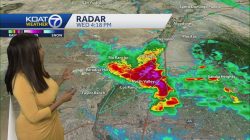Unseasonal Heatwave Sweeps South Korea
South Korea is experiencing an unseasonal heatwave that has pushed temperatures to unprecedented levels, breaking century-old records. On July 8, the capital city of Seoul recorded a scorching high of 37.8 degrees Celsius (100 degrees Fahrenheit), marking the highest temperature for the first ten days of July since weather observations began in 1908. This record-breaking heat marks the hottest start to July in 117 years.
The current heatwave is being fueled by hot easterly winds that are sweeping across the region. As these winds descend from the Taebaeksan Mountains, they become warmer and drier, significantly raising temperatures in the western parts of the country. This natural phenomenon is contributing to the prolonged and intense heat conditions that have been gripping the area.
A key factor behind the persistent heat is the presence of two overlapping pressure systems over the Korean Peninsula. The Tibetan High, located in the upper atmosphere, and the North Pacific High, situated near the surface, are creating a “double blanket” effect. This combination traps heat and prevents it from escaping, leading to stifling conditions across the region.
As a result of this atmospheric setup, the influx of hot, dry easterly winds is causing heat to accumulate like stacked bricks. Each passing day brings increasingly severe conditions, making the heatwave more dangerous and uncomfortable for residents. The Korea Meteorological Administration has warned that this abnormal heat is expected to continue at least through the weekend, with no immediate signs of relief.
Impact on Daily Life
The extreme temperatures are having a significant impact on daily life in South Korea. Public health officials have issued warnings about the dangers of heat exposure, urging citizens to take precautions such as staying hydrated, avoiding outdoor activities during peak hours, and using air conditioning where possible. Hospitals have reported an increase in cases of heat-related illnesses, including dehydration and heat exhaustion.
Schools and businesses have also had to adjust their schedules to accommodate the extreme weather. Some schools have implemented early dismissal times or closed temporarily to protect students from the heat. Outdoor events have been canceled or postponed, and public transportation systems have seen increased usage as people seek shelter from the sun.
Environmental and Economic Consequences
The heatwave is not only affecting human health but also taking a toll on the environment and economy. Crops are suffering from the excessive heat, which can lead to reduced yields and higher food prices. Water usage has surged as farmers and households rely more heavily on irrigation and cooling systems. Energy demand has also spiked, putting pressure on the power grid and increasing the risk of blackouts.
In addition, the heat is exacerbating air pollution, particularly in urban areas where vehicle emissions and industrial activity contribute to poor air quality. This combination of heat and pollution poses additional health risks, especially for vulnerable populations such as the elderly, children, and those with pre-existing medical conditions.
What Lies Ahead?
While the current heatwave is expected to last through the weekend, experts warn that similar events could become more frequent due to climate change. Rising global temperatures are increasing the likelihood of extreme weather events, including heatwaves, droughts, and heavy rainfall. As a result, South Korea and other countries in the region will need to adapt to these changing conditions by investing in infrastructure, improving emergency response systems, and promoting sustainable practices.
For now, the focus remains on coping with the immediate effects of the heatwave. Residents are advised to stay informed about weather updates, follow public health guidelines, and take necessary precautions to protect themselves and their communities. As the summer progresses, the challenge of managing extreme heat will likely remain a pressing concern for the nation.







